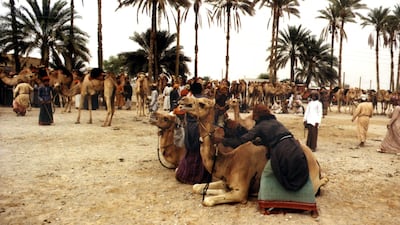A top racing camel in Oman has been sold to an Emirati breeder for Dh2.6 million, the highest sum paid for an Omani camel in the last 20 years.
Mohammed Al Farsi’s camel crossed the line first in Sohar last November in the annual Al Batnah camel race, where its performance was noticed by camel breeder Ali Al Suwaidi. The male camel, named Marzook, also won a competition in March last year in the coastal town of Sur.
Sohar is one of the biggest camel racetracks in Oman.
"Ali Al Suwaidi was apparently there in Sohar watching the camel race competition. He offered me a much lower price for my camel at that time and I refused. But last week, he came back with the sum I wanted for my camel and we closed the deal," said Mr Al Farsi.
He said Mr Al Suwaidi, a camel breeder from Sharjah who frequently travelled to Oman looking for thoroughbreds, bought Marzook for its racing ability.
In 1997, a Saudi breeder paid 195,000 rials (Dh1.9m) for an Omani racing camel that had won two competitions in the sultanate that year. Oman has more than a dozen camel racetracks and breeders from other Gulf countries visit regularly to scout for new bloodstock.
“It is relatively cheaper to buy good pedigree camels in Oman than in other Gulf countries because it is more economical to breed these animals here. Secondly, the country is the second biggest after Saudi Arabia in terms of size and many breeders are scattered in different towns,” said Fardan Al Hamadani, a camel breeder in Sohar.
In 2003, Qaboos bin Said, the sultan of Oman, donated a million rials for the maintenance of camel racetracks to encourage the sport.
“The average prize for winners in Oman is around 10,000 rials which is very modest when you compare it to other countries in the region, but it is still a thriving sport here with a large following," Mr Al Hamadani said. "It is only 30 per cent compared to the average prize money given to a winning camel in other GCC countries.”

